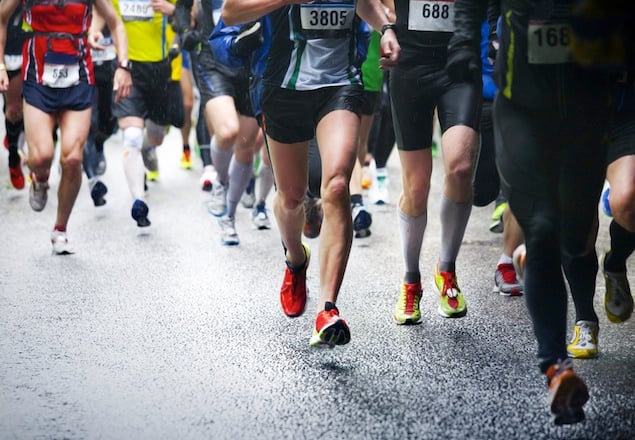You’ve passed the finish line, retrieved your medal, and gathered congratulations from family and friends. The marathon is over, and so is your training—right?
Not so much. The days and weeks following your 26.2-mile run are some of the most crucial to prevent injury and guarantee a quick recovery. We asked Jason Fitzgerald, a USA Track & Field-certified coach and author of 101 Simple Ways to be a Better Runner, for some tips on how to treat your body post-race—all of which can also help after shorter runs.
1) Start recovery even before the starting gun
“The marathon is a very stressful event,” says Fitzgerald, “so recovery needs to begin well before you start running.” The best way to prevent injury post-race, he says, is to be prepared beforehand by focusing on training that builds in strength exercises—like the medicine ball workout found below—which will limit soreness after the event.
2) Take some time off
“People need to understand how marathon running affects your body,” said Fitzgerald. “Beyond physical damage, you’ve fatigued your central nervous system and caused hormonal damage. It can take three to four weeks to completely recover.”
He recommends taking 5 to 14 days off from running following a marathon, depending on the intensity of the athlete and level of soreness or pain. Try to do 15 to 30 minutes of zero-impact cross-training the day after the race to work on moving tired muscles. This includes swimming, cycling, pool running, or a very easy walk.
Following three to five days of rest, Fitzgerald says runners can start incorporating dynamic exercises and core exercises into their workouts, like the ITS rehab routine listed below.
3) Eat and sleep smart
To jump-start recovery, Fitzgerald recommends that racers focus on carbs to restock glycogen in the muscles minutes after they’re finished running, and drink plenty of water in the days following the race.
However tempting it may be, Fitzgerald says to skip the massage offered at post-race festivities to avoid even more trauma to exhausted muscles.
“The number one way to recover is sleep,” he says. He recommends racers schedule an extra hour of sleep per day the week after to help calm the nervous system and aid recovery.
4) Practice a structured approach to post-race running
Once the body has had ample amount of time to recover and rebuild, Fitzgerald cautions athletes to take it easy when they start running again. The first run back should be a light “diagnostic run”—two to four miles of slow jogging to assess how the body is feeling. He also advises that runners leave a two-month gap between their marathon and the next race, which shouldn’t be a very long distance.
Suggested exercises
ITB Rehab Routine: These exercises, focused on hip and glute strength, are good for post-marathon recovery.
Tomahawk Medicine Ball Workout: This all-body workout works core strength, glutes, and shoulders. Fitzgerald recommends runners reserve this workout for before the marathon to increase strength and prevent injury.













